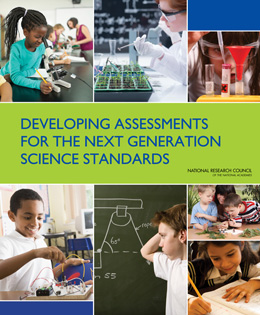All High School resources
eBook
Argument-Driven Inquiry in Chemistry: Lab Investigations for Grades 9-12 (e-book)
Transform your chemistry labs with this guide to argument-driven inquiry. Designed to be much more authentic for instruction than traditional laboratory activities, the investigations in this book give high school students the opportunity to work the...
NSTA Press Book
The NSTA Quick-Reference Guide to the NGSS, High School
Since the release of the first draft of the Next Generation Science Standards (NGSS), NSTA has been at the forefront in promoting the standards and helping science educators become familiar with and learn to navigate this exciting but complex documen...
NSTA Press Book
The NSTA Quick-Reference Guide to the NGSS, K-12
Since the release of the first draft of the Next Generation Science Standards (NGSS), NSTA has been at the forefront in promoting the standards and helping science educators become familiar with and learn to navigate this exciting but complex documen...
NSTA Press Book
Hard-to-Teach Biology Concepts, Revised 2nd Edition: Designing Instruction Aligned to the NGSS
“This book does not contain a recipe to follow as you plan and deliver lessons. Nor is it a set of predesigned lessons for use in biology classrooms. Instead, it features both an instructional framework you can use as you plan and sets of research-...
By Susan Koba, Anne Tweed
Acquired Book
Developing Assessments for the Next Generation Science Standards
Assessments, understood as tools for tracking what and how well students have learned, play a critical role in the classroom.Developing Assessments for the Next Generation Science Standardsdevelops an approach to science assessment to meet the vision...
NSTA Press Book
Introducing Teachers and Administrators to the NGSS: A Professional Development Facilitator's Guide
REVERE Award Finalist, PreK-12 Learning Group, Association of American Publishers!If you’re charged with helping educators achieve the vision of the new science standards, this is the professional development resource you need. This book is chock-f...
By Eric Brunsell, Deb M. Kneser, Kevin J. Niemi
NSTA Press Book
If you and your students can’t get enough of a good thing, Volume 2 of Uncovering Student Ideas in Physical Science is just what you need. The book offers 39 new formative assessment probes, this time with a focus on electric charge, electric curre...
By Page Keeley, Rand Harrington
NSTA Press Book
Using Physics Gadgets and Gizmos, Grades 9-12: Phenomenon-Based Learning
What student—or teacher—can resist the chance to experiment with Rocket Launchers, Drinking Birds, Dropper Poppers, Boomwhackers, Flying Pigs, and more? The 54 experiments in Using Physics Gadgets and Gizmos, Grades 9–12, encourage your high sc...
By Matthew Bobrowsky, Mikko Korhonen, Jukka Kohtamäki




